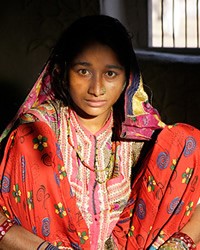Kacchi in Kenya

Photo Source:
Nevil Zaveri - Flickr
Creative Commons
|
Send Joshua Project a map of this people group.
|
| People Name: | Kacchi |
| Country: | Kenya |
| 10/40 Window: | No |
| Population: | 19,000 |
| World Population: | 119,500 |
| Primary Language: | Kacchi |
| Primary Religion: | Hinduism |
| Christian Adherents: | 0.30 % |
| Evangelicals: | 0.10 % |
| Scripture: | New Testament |
| Ministry Resources: | No |
| Jesus Film: | Yes |
| Audio Recordings: | Yes |
| People Cluster: | South Asia - other |
| Affinity Bloc: | South Asian Peoples |
| Progress Level: |
|
Introduction / History
In 1949, the Indian government allowed one representative from each tribal group to be in the legislature. The state of Cutch was the least developed at that time. However, in spite of their disadvantages, some of the Cutch have become very successful international merchants. In the 1700s they were establishing their markets in East Africa, including what is now Kenya. Many migrated to Kenya and Tanzania and now live in the main cities and along important trade routes. We call these people Kachchi, the same name as their language. The Kachchi who have emigrated are usually from the higher, wealthier castes and have maintained several aspects of their own culture. During the days of British colonialism, the Kachchi people migrated to their colonies in Africa. Kachchi people remain in Kenya, Malawi and Tanzania.
What Are Their Lives Like?
In Kenya and Tanzania, Kachchi is only spoken at home. English is the trade language and the language taught in schools. The Cutch in Kenya are often bi- or trilingual, speaking either English and/or Swahili as well as Kachchi. Many of them work as masons and merchants.
What Are Their Beliefs?
The Kachchi are largely Hindu, with the remainder following Islam. The religious practices of the Hindus vary greatly, however. In Gujarat, for example, their beliefs are a mixture of Islam and Hinduism. Both Muslims and Hindus observe the special Hindu festival of Holi and have household gods. Those in Africa, on the other hand, do not hold as many folk beliefs. This can be attributed to their introduction to and familiarity with technology and education.
They believe that the soul may be reincarnated as an animal or as a human. The law of karma states that every action influences how the soul will be born in the next life. If a person lives a good life, his soul will be born into a higher state. Whereas, if he leads an evil life, his soul will be born into a lower state, perhaps even as a worm! The cycle continues until spiritual perfection is achieved. Then the soul enters moksha, a new level of existence, from which it never returns.
Hindu shrines contain sculptured images of their gods. Everyday priests wash and dress the images and bring them food. This is not considered idol worship since they believe the gods are actually present in the images.
The Kachchi Hindus hope to better their positions in this life and in the life to come by exhibiting charity, being devoted to the gods, and showing mercy to others.
What Are Their Needs?
Both Hinduism and Islam are influences that keep them away from the only savior. Resources such as Christian broadcasts and literature are needed to help spread the gospel more effectively. Most of all, laborers are needed to live among them and demonstrate the love of God towards them. Unless the Kachchi see Christianity lived out, they will never understand that true peace is found in Christ alone.
Prayer Points
Ask the Lord to call people who are willing to live among the Kachchi and share Christ with them.
Pray that the Kachchi who speak English will be evangelized and take the gospel to others in East Africa and India.
Ask God to strengthen, encourage and protect the small number of Kachchi believers.
Ask the Holy Spirit to soften the hearts of these Hindus and Muslims towards Christians so that they will be receptive to the gospel.